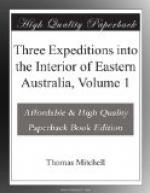WATER FOUND NEXT DAY. DISCOVER A SMALL RIVER.
I galloped impatiently towards the line of wood, and found there a meandering channel full of water, with steep banks of soft earth, apparently a small river, and I hastened back with the welcome intelligence to the men. The extreme heat and the fatigue of travelling could not have been borne much longer. One man (Woods) had been left behind at his own request, being unable even to ride, from violent pains in his stomach; another was also so ill that he could not walk; the bullocks still drew, but with their tongues protruding most piteously. I sent a man on horseback back with a kettleful of water to Woods. The cattle being unyoked rushed to the stream, and in half an hour we were all comfortably encamped, with good grass beside us for the cattle. The bottom of this small river-channel was in no part gravelly, but consisted of soft earth, in which however the cattle did not sink very deep. Fragments of flint, basalt, and quartz, apparently not worn by attrition, abound in the adjacent soil. The general direction of the watercourse appeared to be about 36 degrees north of west.
DUCKS.
At a pond above our camp the carpenter shot two ducks of a kind not previously seen by us, having a purple speck on the head, behind the ear.
We had now arrived in the country beyond the mountains which we had in vain attempted to cross, having found an open and accessible way round them; it remained to be ascertained whether the large river, as described by The Bushranger, was near; according to him it was the first river to be met with after crossing the range north-east by north of Tangulda.
At four P.M. the thermometer stood at 101 degrees. The latitude was ascertained in the evening to be 29 degrees 50 minutes 29 seconds South.
WHEEL PONDS.
January 6.
The morning was rather cool, with clouds and distant thunder. We now proceeded in a northerly direction until we were impeded by scrub, about three miles from the camp. Through this we cut our way, keeping as closely in the northern direction as the openings would allow. At length the wheels of one of the carts, and the axle of another, became unserviceable, and could not be repaired, unless we halted for two days. As they could only be dragged a few miles further, I went forward as soon as we got clear of the scrubs, which extended three miles, in search of water for an encampment. I came upon a slight hollow and followed it down, but it disappeared on a level plain, bounded on each side by rising grounds. One dry pond encouraged my hopes, and I continued my search along a narrow flat, where the grass had been recently on fire. From this point, and while pursuing a kangaroo, I came upon a well marked watercourse with deep holes, but all these were dry. Tracing the line of these holes downwards to where the other flat united with it I found, exactly in the point




